Welcome to the Thursday, Nov. 6, Brew.
By: Briana Ryan
Good morning, Brew readers! In yesterday's Brew, we gave you an update on where things stood in some of this year's biggest elections. Today, we're back with more results and analysis.
For more election results coverage and to stay up to date in the coming days, check out our election results overview page.
Here's what's in store for you today:
- At least 15 Republican incumbents lost re-election in New Jersey and Virginia
- Mississippi Senate loses its Republican veto-proof majority
- California is now the fifth state to redistrict ahead of the 2026 congressional elections
- A look at Virginia's history of split-ticket voting
- Texas voters approve all 17 constitutional amendments on the ballot
- No change in the partisan balance of the mayors of the 100 most populous U.S. cities
- Breaking down noteworthy election results that have happened since our last update
At least 15 Republican incumbents lost re-election in New Jersey and Virginia
At least 15 incumbents lost in the state legislative elections in New Jersey and Virginia, with six New Jersey contests still uncalled as of 5:30 p.m. EST on Nov. 5. That’s the most general election incumbent defeats in an odd year since 21 were defeated in 2011. All 15 defeated incumbents were Republicans.
Twelve Republican incumbents lost re-election in Virginia, where Democrats expanded their majority by 13 seats, going from 51 to 64 seats in the 100-member chamber. That tied 2017 for the most incumbents defeated in the chamber’s elections since 2011. This was the first time Democrats retained an existing House majority after the general elections since 1997.
Ballotpedia identified 23 Virginia House districts as battleground elections. Heading into the elections, Republicans controlled 18 to Democrats’ five. After the elections, Democrats control 18 to Republicans’ five.
At least three incumbents lost in New Jersey, where six races remain uncalled. At least one incumbent lost in every general election for the General Assembly since 2011, except in 2017. Five General Assembly incumbents were defeated in each of the previous two general elections leading up to 2025.
The 15 incumbent defeats so far represent a 15% increase from the 13 in 2023. It also means at least 8.9% of the 168 incumbents who ran in the general election between the two states were defeated, or 10.1% of the 149 who were contested. An average of 4.3% of incumbents who ran in odd-year general elections between 2011 and 2023 lost re-election.
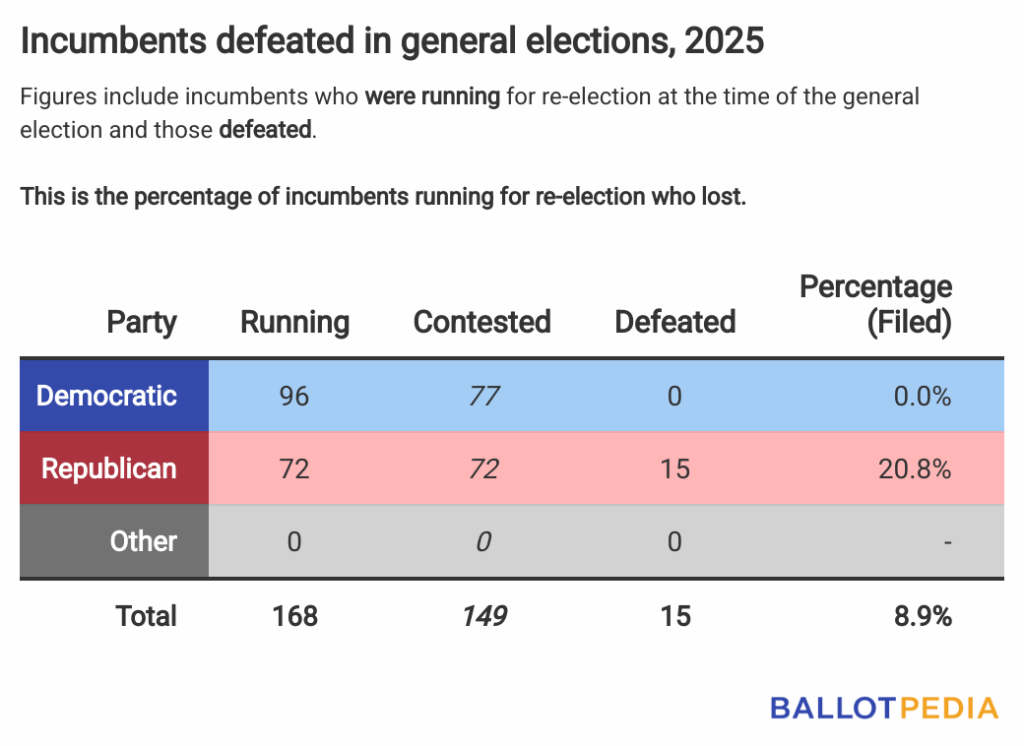
This year’s elections also marked the first time any odd-year state legislative general election since 2011 produced only Republican incumbent losses and no Democratic incumbent losses. The reverse did happen in 2021, when 14 Democratic incumbents and no Republican incumbents lost in the general elections.
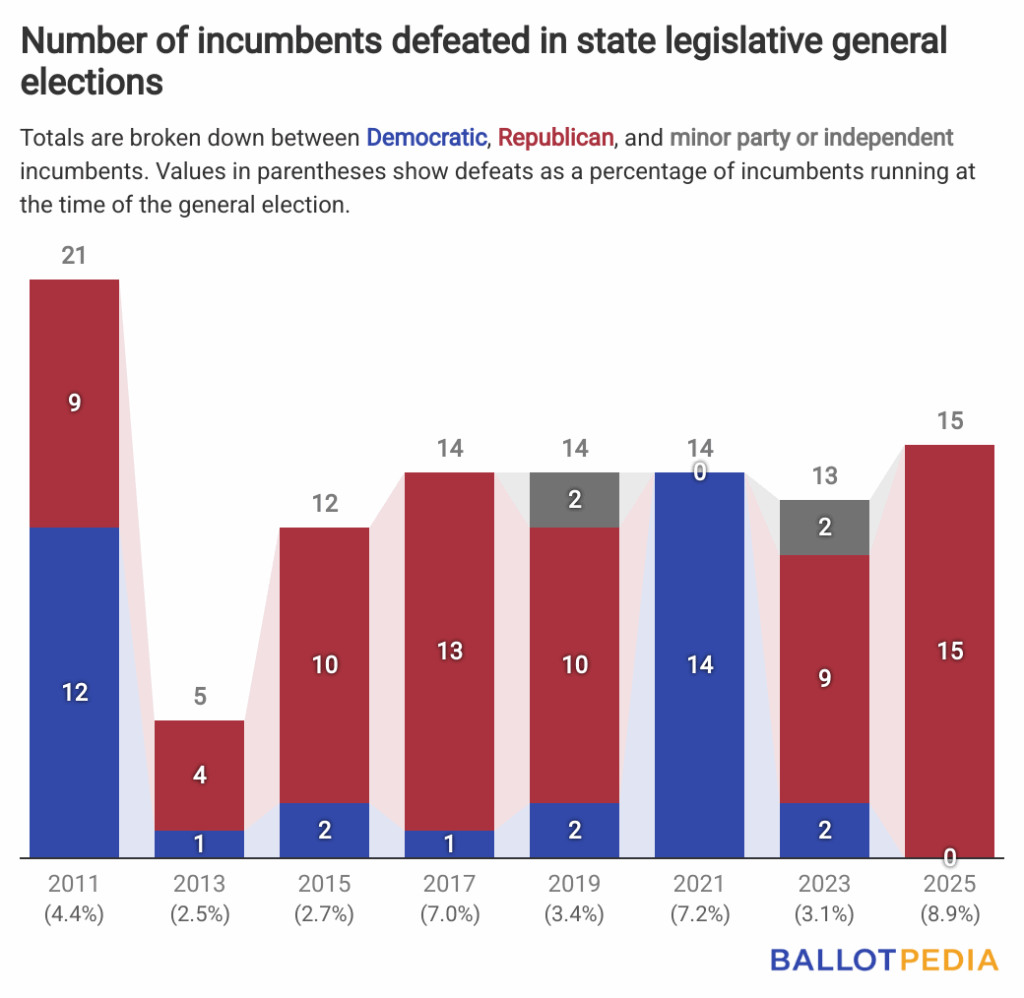
Together with the three incumbents who lost in the New Jersey primaries earlier this year, a total of 18 incumbents were defeated in 2025. So far, that’s below the average of 23 total in odd years since 2011. Only two years produced fewer incumbent losses—2017 (14 total losses) and 2013 (seven total losses).
Click here for more information about incumbents who were defeated in state legislative elections this year.
Mississippi Senate loses its Republican veto-proof majority
Democrats gained two seats in the Mississippi Senate, bringing the chamber to a 34-18 Republican majority and eliminating Republicans' veto-proof majority. Heading into the elections, Republicans had a 36-16 majority in the Mississippi Senate—one more than the minimum of 35 required to override a gubernatorial veto. Mississippi is one of 36 states that require a two-thirds vote from both chambers of the Legislature for there to be a veto-proof majority.
Democrats broke that veto-proof majority after gaining two seats in the chamber in special elections held on Nov. 4. In total, Mississippi held 10 legislative special elections, eight in the Senate and two in the Mississippi House of Representatives, on Nov. 4. Six of the Senate elections and one of the House elections were the result of redistricting. The state passed new state legislative maps after a three-judge district court panel ruled in July 2024 that the previous maps did not contain enough majority-Black districts.
Currently, there are 27 state legislatures with veto-proof majorities—eight Democratic and 19 Republican. In two states—Kansas and Kentucky—one party had a veto-proof majority in the legislature, and the other party held the governor's office.
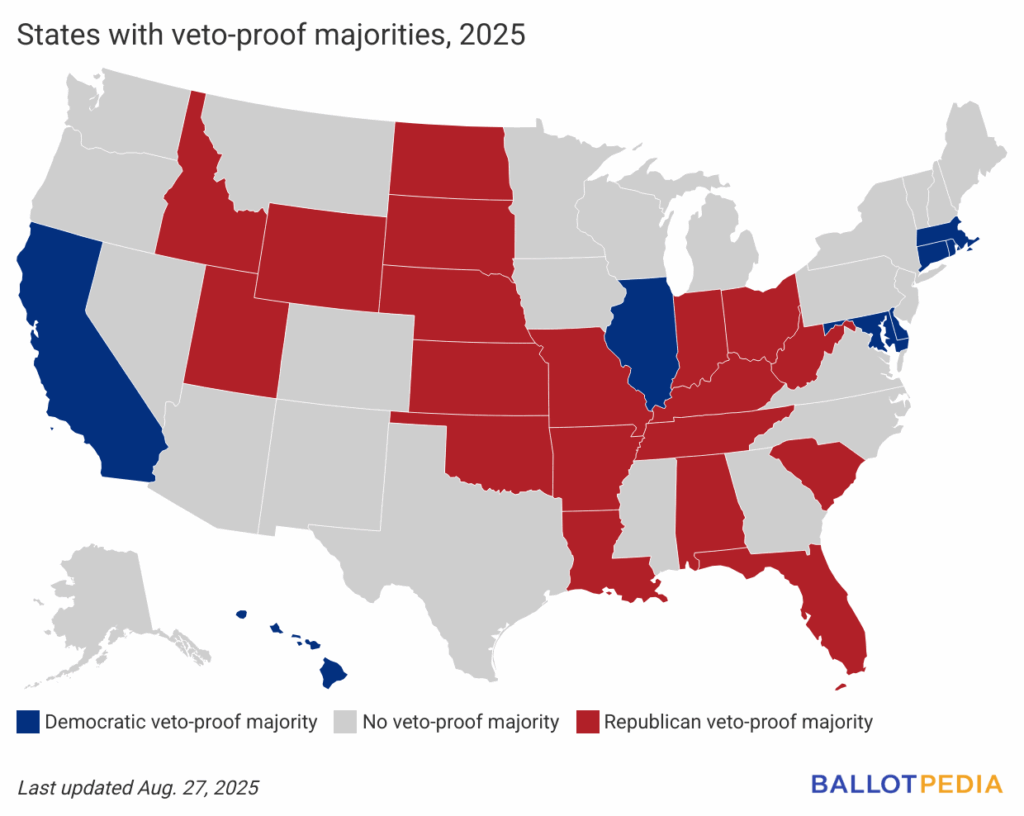
Click here to read more about the results of the special elections in the Mississippi Legislature.
California is now the fifth state to redistrict ahead of the 2026 congressional elections
California became the fifth state to redraw its congressional districts ahead of the 2026 elections after voters approved Proposition 50 on Nov. 4. The new map makes five districts more favorable to Democrats according to 2024 presidential results. That could lower the net gains from redistricting in Republican-led states from nine districts to four nationwide.
California Gov. Gavin Newsom (D) stated that California’s new map was a response to redistricting in TexasTexas became the first state to enact new congressional district boundaries ahead of the 2026 elections on Aug. 29. That map shifts five Democratic districts toward Republicans according to 2024 presidential election results.
Since then, three other Republican-led states have enacted new congressional maps—two voluntarily and one due to a constitutional requirement. On Sept. 28, Missouri enacted a new congressional map that aims to net one Republican district by drawing parts of Kansas City into surrounding rural areas. North Carolina enacted a new map on Oct. 22 that makes the 1st District, currently represented by Democratic U.S. Rep. Don Davis, more favorable to Republicans. According to Inside Elections, President Donald Trump (R) would have won the district by 12 points in 2024.
Ohio was the only state required by law to redistrict, because the commission’s 2022 map did not have bipartisan support. On Oct. 31, the Ohio Redistricting Commission approved a new map that, according to data from the commission based on recent statewide election results, could make two districts more competitive for Republicans.
Altogether, Republicans could net four districts nationwide as a result of mid-decade redistricting. As of Nov. 5, Republicans had a 219-213 majority in the U.S. House with three vacancies.
Five states—three Republican-led and two Democratic-led—are still considering redistricting before the midterm elections. A new Utah map, drawn by the Legislature due to a court order, awaits District Judge Dianna Gibson’s consideration. She is expected to issue a ruling by Nov. 10.
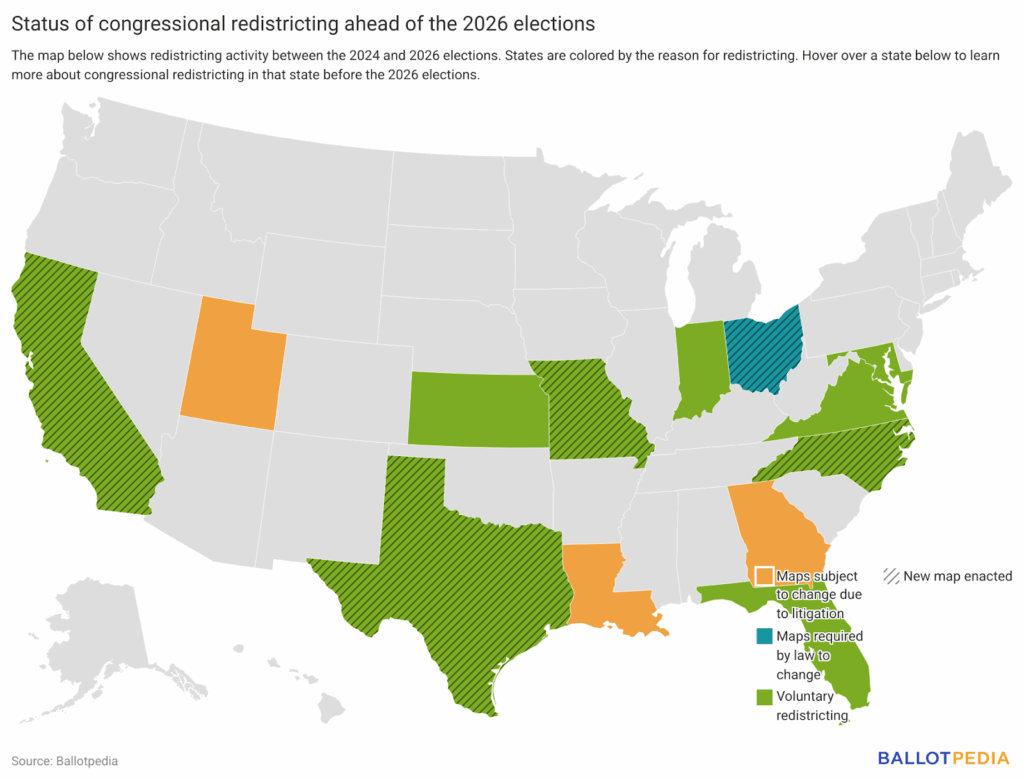
The Florida Legislature formed a special redistricting committee that has not yet met. Indiana lawmakers will consider redistricting, in response to Gov. Mike Braun’s (R) call for a special session, during the first two weeks of December. Kansas House Speaker Dan Hawkins (R) announced the House did not gather enough votes to call a special session, but the Legislature could still take up redistricting at the start of its regular session in January.
Maryland Gov. Wes Moore (D) announced the creation of a redistricting advisory commission on Nov. 4 that would propose a new congressional map ahead of the 2026 elections. Maryland Senate President Bill Ferguson (D) had previously told the chamber's Democrats that "the Senate is choosing not to move forward with mid-cycle redistricting."
In October, the Virginia General Assembly approved a constitutional amendment that would allow the state to redraw its congressional lines. The amendment must pass the General Assembly again after new officeholders are sworn in before being placed on the ballot for voters to decide.
Click here to learn more about congressional redistricting ahead of the midterm elections.
A look at Virginia's history of split-ticket voting
Heading into the Virginia elections, media outlets reported that there was a possibility of split-ticket voting for the three statewide offices—governor, lieutenant governor, and attorney general—on the ballot. However, the three Democratic candidates on the ballot won their respective elections—keeping with the commonwealth's 20-year trend of not electing candidates from multiple parties for the three offices.
Split-ticket voting happens when voters select candidates from different political parties on the same ballot. During the Oct. 24 episode of our podcast, On the Ballot, The Virginia Scope's Brandon Jarvis explained to our host Norm Leahy that polls consistently showed the Democratic candidate ahead of the Republican candidate in the gubernatorial race. Jarvis also said that polls showed tighter races between the candidates for lieutenant governor and attorney general.
Since we began following elections for these offices in 2001, Virginia voters have elected candidates from multiple parties for the three offices on two occasions. The first time was in 2001 when voters elected Mark Warner (D) as governor, Tim Kaine (D) as lieutenant governor, and Jerry Kilgore (R) as attorney general. The second time was in 2005 when voters elected Kaine as governor, Bill Bolling (R) as lieutenant governor, and Bob McDonnell (R) as attorney general.
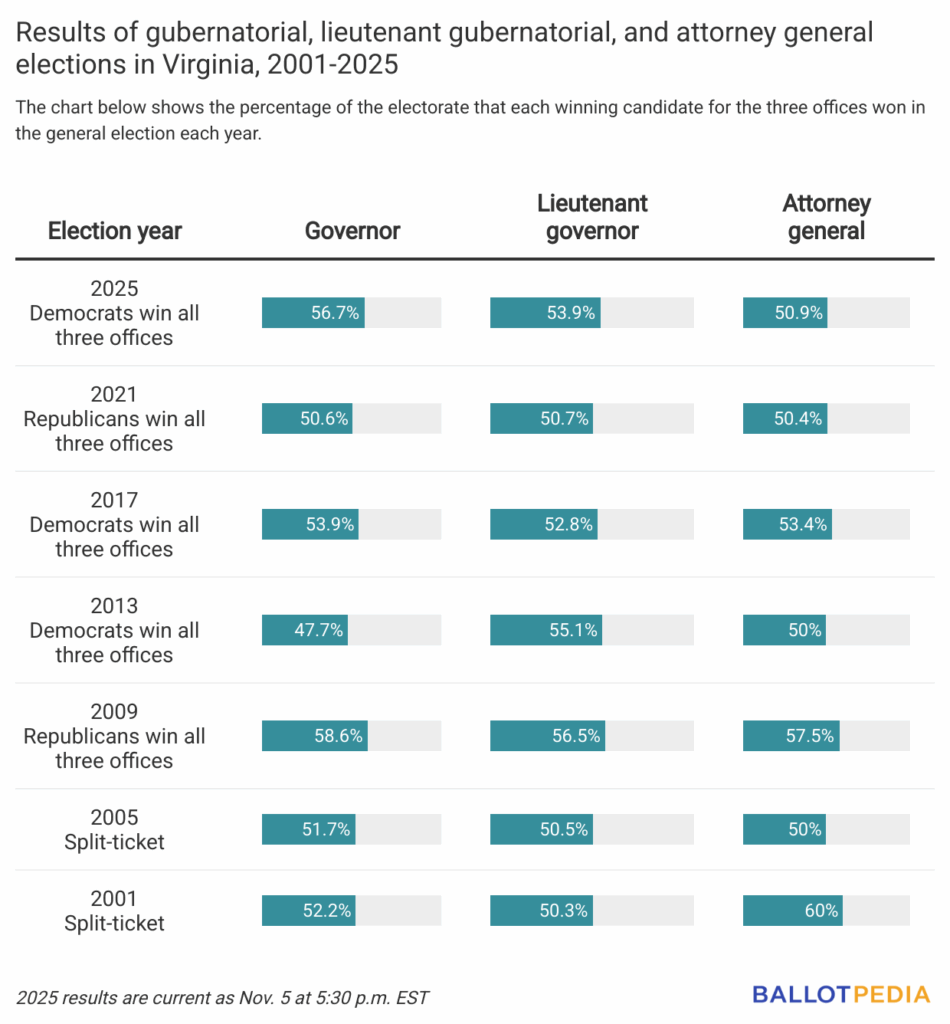
Click here to check results from the statewide elections, including those in Virginia, that we covered on Nov. 4.
Texas voters approve all 17 constitutional amendments on the ballot
Texas voters approved all 17 constitutional amendments that the Legislature put on the Nov. 4 ballot. That includes the following notable amendments: Proposition 2, Proposition 3, Proposition 6, Proposition 8, Proposition 15, and Proposition 16.
This year’s 17 amendments were the most that Texas voters decided on in a year since 2007, when they also decided on 17.
As of Nov. 5 at 5:30 p.m. EST, voters passed the 17 amendments by an average margin of victory (MOV) of 40 percentage points.
- As of Nov. 5 at 5:30 p.m. EST, Proposition 6 passed with the narrowest MOV—10 percentage points. The amendment prohibits laws that impose an occupation tax on a registered securities market operator or a securities transaction tax.
- As of Nov. 5 at 5:30 p.m. EST, Proposition 10 passed with the largest MOV—78 percentage points. The amendment authorizes the Legislature to provide a temporary homestead exemption for improvements made to residences destroyed by fire.
From 1876 through 2024, Texas voters decided on 712 constitutional amendments. Voters approved 531 of those amendments (74.6%) and defeated 181 (25.4%).
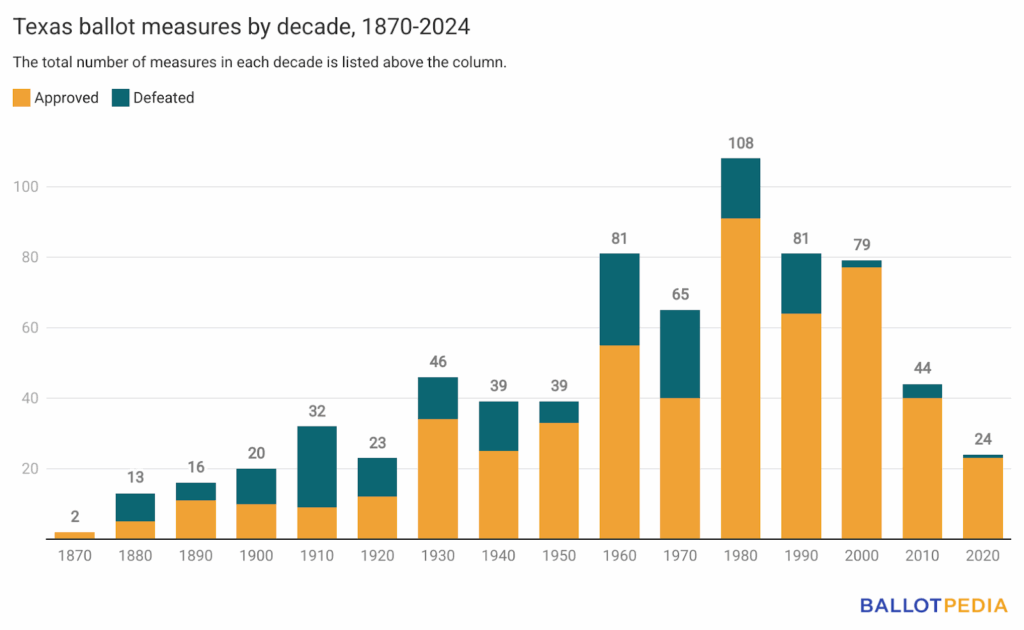
Click here for a breakdown of the 17 constitutional amendments that Texas voters decided on Nov. 4.
No change in the partisan balance of the mayors of the 100 most populous U.S. cities
Eighteen of the 100 most populous U.S. cities held mayoral elections on Nov. 4, and so far, none of those elections resulted in a partisan change. That means this year is on track to be the first time since 2021 that no November mayoral elections resulted in a partisan change.
Looking at the November mayoral elections over the past four years, partisan changes occurred in four out of 23 cities in 2024, two out of 13 in 2023, three out of 16 in 2022, and none of the 17 in 2021.
As of Nov. 5 at 5:30 p.m. EST, winners have been called in 14 of the 18 cities. Democratic mayors will continue to lead all 14 of those cities.
Additionally, three other mayoral elections are headed to runoffs. That's because none of the candidates running in those elections met the required threshold for victory. Those runoff elections will take place in Albuquerque, New Mexico, Jersey City, New Jersey, and Miami, Florida. Miami is the only one of those cities that currently has a Republican mayor.
As of Nov. 5 at 5:30 p.m. EST, one mayoral election has not been called in Seattle, Washington. A Democratic mayor currently leads Seattle.
Click here to read more about the results of mayoral elections in the 100 most populous U.S. cities.


